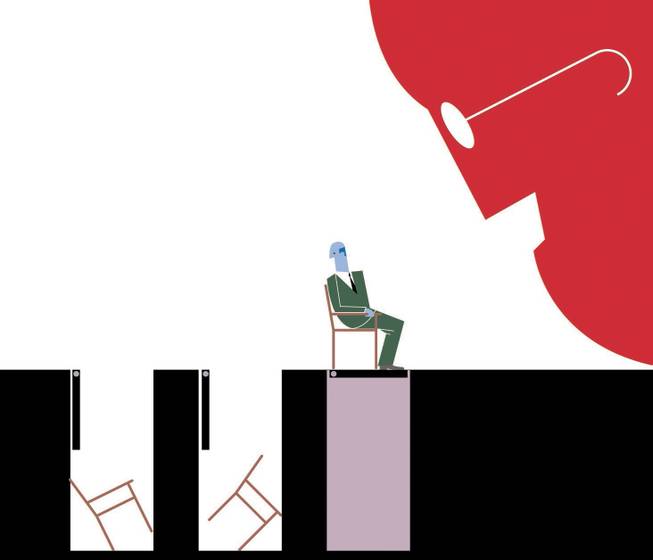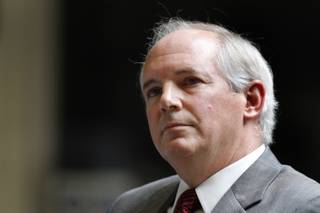Thursday, July 16, 2009 | 2 a.m.
Sun Archives
- For his lobbying, Ashley demoted (7-11-2009)
- UNLV president demoted to university faculty spot (7-10-2009)
- UNLV president garners praise, catches a break (7-8-2009)
- Bonnie Ashley will not be part of the regents’ discussion (7-8-2009)
- Ashley says he's ready to respond to state's concerns (6-27-2009)
- Regents to discuss future of UNLV president at July meeting (6-22-2009)
- Rogers calls for Ashley’s ouster (6-17-2009)
- Rogers: UNLV President Ashley should be fired (6-16-09)
- Decision on Ashley wanted soon (6-9-2009)
Sun Coverage
Beyond the Sun
After ousting its second UNLV president in three years, Nevada’s higher education system is bound to have a hard time recruiting the kind of high-caliber replacement it wants and needs.
The chancellor and the regents want a prolific fundraiser, a top-notch schmoozer and an outstanding manager with a solid academic background whom faculty can rally behind.
But the bar is even higher than that. The college also needs someone who can lead it out of its low rankings in a time of unprecedented fiscal hardship while boosting community support.
If the system decides to do a national search, recruitment is likely to be messier than the one that brought David Ashley to Las Vegas, as then-Chancellor Jim Rogers’ second choice, in 2006, experts said this week.
If what happened in Vegas wasn’t the talk among college administrators across the country, it will be by the end of this week because the industry’s main periodical, The Chronicle of Higher Education, just published a lengthy story detailing Ashley’s hearing and predicting his treatment will hinder the university’s ability to recruit a replacement.
A leading recruiter told the paper that only the most naive college administrator would be willing to gamble on a job that could end with such a public tribunal, noting that a similar evaluation process in Florida in the 1980s was scrapped because it stymied recruitment.
The Chronicle used Ashley’s situation to question whether the Nevada higher education system would be able to get another university president to conduct an evaluation of a peer in Nevada. The reason: Regents publicly grilled Cal State Fresno President John Welty for more than an hour about his evaluation of Ashley, and some accused Welty of whitewashing his findings.
The industry periodical said the system might face lawsuits over tarnishing the reputations of Welty and Ashley.
Still, several experts told the Sun that though Ashley’s demotion will be a major issue, it is not an insurmountable one.
“Nevada, and particularly Las Vegas, has long been regarded as a somewhat politicized place with a lot of tensions and turmoil and conflict,” said Peter Magrath, an education consultant who has served as president and interim president of universities. “This is not something that just happened yesterday. But I don’t think it’s a disaster case that is irreparable. These situations happen pretty often in American higher education.”
Nevada’s new chancellor, Dan Klaich, in fact, contends that Ashley’s evaluation was handled as well as possible, given the requirements of public meeting laws in the state, and could work to the system’s advantage.
“I would hope people would look at the professionalism with which they (the regents) handled that and say, ‘That’s a board I’d like to work for,’ ” he said. “I think the way the board handled it will strengthen its recruiting hand.”
The UNLV presidency will appeal to ambitious academic administrators. The university, after all, is “a prominent institution in a state with a growing population. That makes it a desirable position,” said Terry Hartle, senior vice president of the Washington, D.C.-based American Council on Education.
But the turnover at the top and the widely publicized controversy that surrounded it will raise huge red flags for potential applicants. The interviewers — the regents and the new chancellor — will be turned into interviewees, facing tough questions about the stability of the job and the autonomy of the president, Hartle and others said.
“I think anybody who looks at the position will be acutely aware of the recent developments at the school and will want some assurances that the position will come with the necessary autonomy to continue to advance the institution,” Hartle said.
Klaich argues that UNLV’s tribulations are actually good for the process — it will thin the herd and lead to a better pool of stronger, more qualified applicants.
“I think there will be people out there that see the opportunity to shape the future of this state and there will be great people who will accept that challenge,” he said.
Plenty of rising administrators in the U.S. are looking for challenging positions in up-and-coming states — but plenty of universities are looking for presidents too. The competition right now includes Kansas Wesleyan University, New Mexico State University, Regent University in Virginia, Southern Illinois University Carbondale, Virginia State University, Delaware State University, Montana State University, Central College in Iowa and Washington College in Maryland.
In some ways UNLV stacks up well against other universities. Barring total economic collapse, the budget appears resolved in Nevada until 2011. Meanwhile California is issuing IOUs, its research university system is slashing hundreds of millions of dollars from its budget this week and its state colleges have warned of significant admissions cuts for 2010. California and other states with full-time legislatures are expecting more budget cuts within a year.
“Higher ed is suffering everywhere,” Hartle said. “Nevada, on the other hand, is pretty stable. You don’t have to look hard to find states that have more funding per student than UNLV today but which won’t in a short period of time.”
And when it comes to pay, sure, base salaries for Nevada university presidents are well below average for peer universities in the West, and Nevada’s universities lack the on-campus housing provided for presidents in other states. But the total salary and benefits package offered to Ashley included a six-figure salary boost from the UNLV Foundation, putting the total compensation solidly in the middle of the pack.
How much talent from elsewhere that money can buy under these circumstances remains to be seen. UNLV might be better served by waiting before settling on a new president, some experts said.
“The situation must be stabilized and calmed down, but the right person and personality must be brought in,” Magrath, the education consultant, said. “If the interim president has the confidence of the faculty and staff as well as community support, and if that person can have a really good professional working relationship with the chancellor and regents, I absolutely believe the system and UNLV can eventually attract a great president.”



Join the Discussion:
Check this out for a full explanation of our conversion to the LiveFyre commenting system and instructions on how to sign up for an account.
Full comments policy